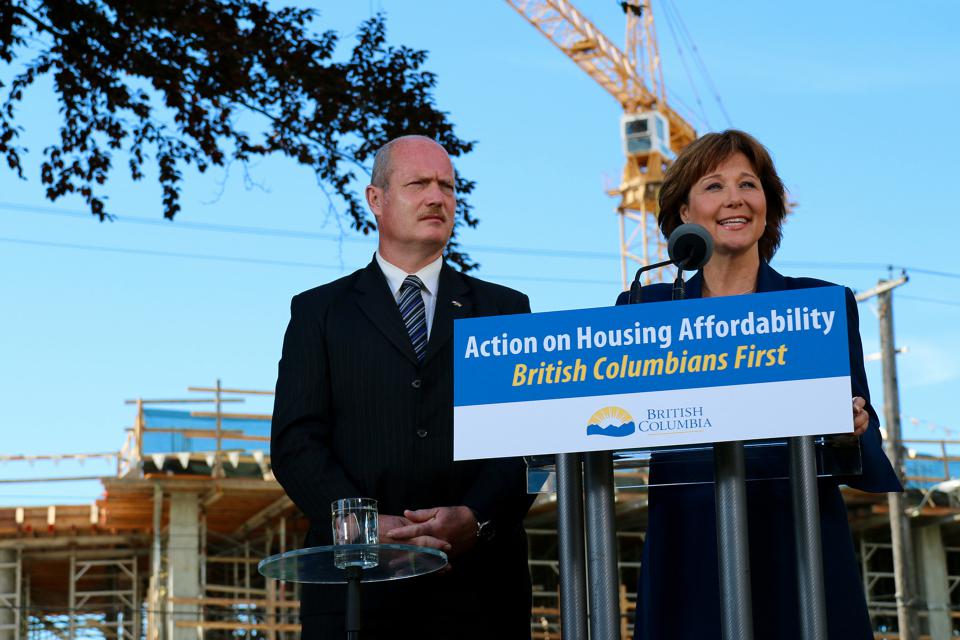“And after six months when a foreign-ownership tax fails, it will only cause racially charged conversations to go beyond where they are now.” — Real-estate mogul and BC Liberal donor Bob Rennie, June 2016.
Premier Christy Clark built a house of cards that could collapse when British Columbians vote in just seven weeks — because both housing prices and foreign ownership are once again rising in Metro Vancouver, which has the third worst housing affordability among the world’s major centres.
It’s happening just as the BC Liberal government last week exempted foreign nationals with work permits and, potentially, up to 170,000 foreign students from the Metro Vancouver 15-per-cent foreign buyers tax, letting them apply for refunds if they recently bought homes.
And in Victoria — where there is no foreign buyer tax — Canada Mortgage and Housing Corporation issued a “red warning” alert due to rapid price hikes and overvaluation of housing.
“Evidence of problematic conditions has increased in Victoria since the previous assessment due to moderate evidence of price acceleration and overvaluation,” the CMHC report stated.
In Metro Vancouver, the condominium benchmark price jumped 2.3 per cent over the past six months to $526,300.
And Reuters reports Vancouver housing prices rose 0.3 per cent in January, while Sotheby’s International Realty Canada says international buyers, predominantly Chinese nationals, are expected to adjust to the foreign buyer tax.
“So we believe that in 2017, we’ll probably see an increased interest in properties in Vancouver,” Brad Henderson of Sotheby’s told the Canadian Press in March. Henderson added that most Chinese housing property searches were for real estate priced below $655,000, dispelling views that luxury housing was the primary interest.
Higher housing prices and renewed foreign buyer interest are a huge challenge for the BC Liberals, because several polls say the most important issue in this election is affordable housing — and increasingly the province doesn’t have any.
With housing, poverty and homelessness listed as the most pressing concern for 29 per cent of B.C. voters compared to 18 per cent for health care and 17 per cent for jobs and the economy, according to an Insights West poll in November, the BC Liberals’ emphasis on their financial management doesn’t seem as important.
And the poll showed that just 19 per cent of respondents felt Clark had done a very good or good job on housing, poverty and homelessness, while a huge 71 per cent said Clark had done either a very bad (32 per cent) or bad job (39 per cent) on the issue.
What’s more, the B.C. economy has become perversely dependent on property tax instead of revenue from natural resources, tourism, high tech or anything else and real estate speculation has allowed Clark to balance the budget and use a $1.5-billion surplus to make pre-election spending promises.
In 2015, an astonishing 30 per cent of the province’s gross domestic product came from the real estate sector and in 2016 it’s estimated that jumped to 40 per cent, while resource sector revenue was under seven per cent of GDP.
It all means that Clark’s BC Liberals are desperately trying to shore up their lack of credibility on housing issues just weeks before the election, explaining their willingness to risk voter condemnation for using taxpayer-funded government advertising to promote their first-time homebuyer plan and other measures in partisan TV commercials.
And while condo marketing master Bob Rennie, who recently stepped down as BC Liberal Party fundraising chair, strongly opposes the foreign home buyer tax, his predictions about its impact have only been half-right. The tax has not triggered a wide outbreak of racist-tinged talk, although that remains a concern.
But Rennie was right about the foreign ownership tax failing. The question that has to be put to Clark and the BC Liberals is whether they would cancel the tax if they win the election and developers ask for it, rather than extending it to all of British Columbia, which would make more sense.
After all, the real estate industry has contributed $12 million of the $70 million in corporate donations to the BC Liberal Party between 2005 and 2015, more than double the contributions from mining and forestry, the next biggest donors.
Because what “failure” of the tax means to those who make windfall profits selling housing is that sales are no longer going through the roof and prices aren’t rising by 32 per cent a year, as they did between June 2015 and 2016, before the tax was announced in July.
Failure definitely does not mean that foreign buyers have stopped buying Metro Vancouver houses, driving up prices.
While some pundits don’t believe housing will be the dominant election issue, even some business organizations traditionally supportive of the BC Liberal approach are very concerned.
“Low housing affordability reduces the region’s ability to attract and retain talent, particularly when it comes to younger demographics. Decreased access to skilled human capital has the potential to deter businesses from locating or growing in the Greater Vancouver region,” says a new report from the Greater Vancouver Board of Trade, whose CEO is former BC Liberal cabinet minister Iain Black.
The inconvenient truth for Christy Clark is that housing affordability is still well beyond the reach of buyers and renters alike in Metro Vancouver and getting rapidly worse everywhere in B.C. — and for many voters it will be the top issue in the May 9 election. ![]()
Read more: BC Election 2017, BC Politics, Housing

















Tyee Commenting Guidelines
Comments that violate guidelines risk being deleted, and violations may result in a temporary or permanent user ban. Maintain the spirit of good conversation to stay in the discussion.
*Please note The Tyee is not a forum for spreading misinformation about COVID-19, denying its existence or minimizing its risk to public health.
Do:
Do not: